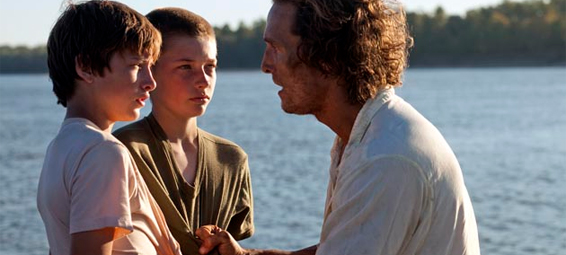Jeff Nichols new film Mud takes place in the sopping wet Arkansas back country. Like 2010’s Winters Bone, the setting offers Nichols a means to blend rural poverty with elements of Gothic thriller. And like Mark Twain’s Tom Sawyer, the setting offers easy access to an American fringe, where youth is tempered by a stark confrontation with the world of adults in the no-man’s land outside the boundaries of civilization. Mud’s river-bound universe offers that peculiarly southern literary blend of the transcendental and the infernal. Warm, crisp light filters through green leaves into a wilderness tinged with magic and primed for adventure, but the earth also gives way to murky pools where copperhead snakes fester and tangle, posing an ever-eminent threat.
The film’s title is only indirectly derived from these muddy pits. “Mud” is actually the nickname of the film’s dramatic catalyst, a kind of grown-up Tom Sawyer played by Matthew McConaughey. Mud is discovered by two boys, Ellis (Tye Sheridan) and Neckbone (Jacob Lofland), who happen upon a strange sight: a boat lodged in a tree, twenty feet off the ground on an island in the middle of the river. When they explore it they discover someone is living in it; soon after Mud discovers them.
What follows is an adventure tale, a love story, a crime thriller, and a coming of age drama, as Ellis and Neckbone befriend Mud, who turns out to be a convict on the lam. His lover, Juniper (Reese Witherspoon), is holed up in a trashy hotel in a nearby town, and the men who want revenge on Mud for his crime continue to pour into the backwater county looking for Mud. Life is scarcely easier for the two boys. Neckbone lives with his uncle, Galen (Michael Shannon) a blubbering, childish nobody who might as well be an older brother and who makes money by diving for oysters in murky river bottom. Ellis’ parents are in the midst of a breakup, and the family rift is stressed further by the fact that Ellis’ houseboat home is parked on the waters of a river reserve, their permission to moor there grandfathered in. If his mom moves out, the boat will be reclaimed by the federal government. Across the river from the houseboat, the recluse Tom Blankenship (Sam Shepard) sits watching, another Twainian trope: the faceless outcast who waits for the arrival of his role’s significance in the third act.
Nichols’ directorial approach here feels a bit like David Cronenberg’s in A History of Violence. Mud is a novelistic, character driven story, but there are elements of genre fiction seeping to the surface. Goon bad guys show up and bust up Ellis’ face when they suspect he has some connection to the missing Mud. Witherspoon’s Juniper is a less-than multi-dimensional tramp, an idealized beauty, a Helen-strumpet (in a trailer trash sort of way). These caricatures can distract from the real humanity rendered through the story’s central relationships, but they also lend the plot necessary momentum.
Mud is not about Mud, primarily; rather, Ellis is the film’s main character. He is both reserved and reflective, yet quick with a punch. When we first meet him, he clocks an upper classman who is harassing a junior girl he has a crush on. Later, he throws himself on a man three times his size trying to protect Juniper. It is his sense of chivalry that also forges his connection with Mud. He is fascinated with the romance of Mud’s story as Mud tells it. The older man is in love, and he is waiting for his woman so he can escape the sufferings of the world for some realm fit for feral souls like his own. It’s a classic fairy tale, but for a kid whose parent’s divorce is cracking his assumptions about love, family, and fidelity, Mud’s tale becomes something else. It is the boy’s source of hope — it is a prophesy of a life that is more than muddy oysters, girls in pickup trucks, and hard-working poverty. Mud’s dream is something nobler than, and exterior to – and therefore should be unencumbered by – reality.
In the past year much has been written about McConaughey’s seemingly orchestrated intent on redefining his career and concentrating on his craft as an actor. Indeed, the drawling Texan heartthrob is brilliant in this film. He plays Mud caged and skittish, like a stray dog, equal parts pitiful and dangerous. His natural, dynamic charisma rides just beneath surface so you believe Ellis attraction to the older man, who is both a brother and an idealized self – an Odysseusan wanderer taking the form of a vagabond. But unlike Ellias, we’re never quite sure. We can more easily see Mud’s relationship to Juniper for what it really is. We distrust the older man’s intentions and yarns. All of it is a testament to Nichols ability to shuffle his story so that we find ourselves moving in and out of Ellis’ perspective.
McConaughey’s performance is good, but it is Tye Sheridan who is the real discovery here. Sheridan was strong in Terrence Malick’s The Tree of Life (the 16-year old’s only other movie that has been released, though he stars in the upcoming David Gordon Green project Joe alongside Nicholas Cage). But Mud offers the young actor more space and depth, and he turns in a performance reminiscent of Thomas Doret from The Kid With a Bike.
Like Cronenberg’s The History of Violence, Mud’s genre goons exert their weight on the story’s trajectory. When things get explosive, there is something lost in Mud, the gentility of its drama, the tender texture of the story. The potential of violence suffices to create tension for much of the film, but when Nichols unleashes the real thing, he paints himself into a corner. The film must be resolved, and it does — neatly and with a tinge of melodramatics. But the narrative resolution comes after the film’s real emotional payoff. That comes during a moment when Elis confronts his tarnished hero Mud on a beach. In this scene we get a crystalline pure image of disillusionment — it is the action of life brandishing the first indelible mark of maturity on a young boy. It is a clinging, desperate scene. It stings like a snake bite.




